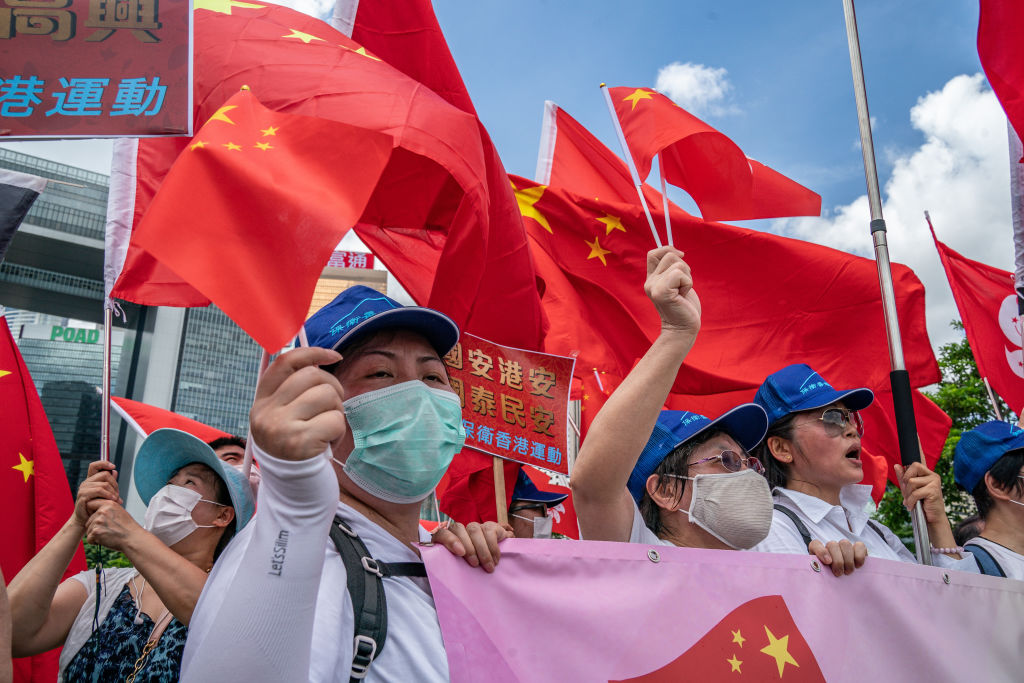China passes controversial Hong Kong security law


A free daily email with the biggest news stories of the day – and the best features from TheWeek.com
You are now subscribed
Your newsletter sign-up was successful
China's National People's Congress Standing Committee unanimously approved a security bill Tuesday that will give Beijing authority to crack down on political dissent in Hong Kong, which has enjoyed significant legal and civil autonomy since being handed over by Britain in 1997, The New York Times and Chinese media in Hong Kong report. The U.S., Britain, and European Union have criticized the law and the U.S. placed limits on exports of U.S. defense equipment and some technology, stripping some of Hong Kong's special trade status.
The approval process in the elite arm of China's party-run legislature "drew criticism for its unusual secrecy," the Times reports. "Breaking from normal procedure, the committee did not release a draft of the law for public comment. Hong Kong's activists, legal scholars, and officials were left to debate or defend the bill based on details released by China's state news media earlier this month."
Beijing says the new law, which will allow the Communist Party central government to set up a security apparatus in Hong Kong to collect intelligence and investigate special cases, will make Hong Kong safer. But it is not popular in Hong Kong, and critics warn it will be used to quash protests, Hong Kong's limited democracy, and dissent among pro-democracy advocates directly and through intimidation.
The Week
Escape your echo chamber. Get the facts behind the news, plus analysis from multiple perspectives.

Sign up for The Week's Free Newsletters
From our morning news briefing to a weekly Good News Newsletter, get the best of The Week delivered directly to your inbox.
From our morning news briefing to a weekly Good News Newsletter, get the best of The Week delivered directly to your inbox.
Chinese President "Xi Jinping is looking at more comprehensive control over Hong Kong, and the national security law will go a long way to achieving that control," Willy Wo-Lap Lam, a longtime commentator on Chinese politics at the Chinese University of Hong Kong, told the Times. "It will be a new ballgame, affecting schools, affecting the media, and many other arenas of Hong Kong life." Beijing passed the law one day before the anniversary of Britain's handover, and for the first time in decades, Hong Kong has banned the usual July 1 protest march.
A free daily email with the biggest news stories of the day – and the best features from TheWeek.com
Peter has worked as a news and culture writer and editor at The Week since the site's launch in 2008. He covers politics, world affairs, religion and cultural currents. His journalism career began as a copy editor at a financial newswire and has included editorial positions at The New York Times Magazine, Facts on File, and Oregon State University.
-
 How the FCC’s ‘equal time’ rule works
How the FCC’s ‘equal time’ rule worksIn the Spotlight The law is at the heart of the Colbert-CBS conflict
-
 What is the endgame in the DHS shutdown?
What is the endgame in the DHS shutdown?Today’s Big Question Democrats want to rein in ICE’s immigration crackdown
-
 ‘Poor time management isn’t just an inconvenience’
‘Poor time management isn’t just an inconvenience’Instant Opinion Opinion, comment and editorials of the day
-
 ABC News to pay $15M in Trump defamation suit
ABC News to pay $15M in Trump defamation suitSpeed Read The lawsuit stemmed from George Stephanopoulos' on-air assertion that Trump was found liable for raping writer E. Jean Carroll
-
 Judge blocks Louisiana 10 Commandments law
Judge blocks Louisiana 10 Commandments lawSpeed Read U.S. District Judge John deGravelles ruled that a law ordering schools to display the Ten Commandments in classrooms was unconstitutional
-
 ATF finalizes rule to close 'gun show loophole'
ATF finalizes rule to close 'gun show loophole'Speed Read Biden moves to expand background checks for gun buyers
-
 Hong Kong passes tough new security law
Hong Kong passes tough new security lawSpeed Read It will allow the government to further suppress all forms of dissent
-
 France enshrines abortion rights in constitution
France enshrines abortion rights in constitutionspeed read It became the first country to make abortion a constitutional right
-
 Texas executes man despite contested evidence
Texas executes man despite contested evidenceSpeed Read Texas rejected calls for a rehearing of Ivan Cantu's case amid recanted testimony and allegations of suppressed exculpatory evidence
-
 Supreme Court wary of state social media regulations
Supreme Court wary of state social media regulationsSpeed Read A majority of justices appeared skeptical that Texas and Florida were lawfully protecting the free speech rights of users
-
 Greece legalizes same-sex marriage
Greece legalizes same-sex marriageSpeed Read Greece becomes the first Orthodox Christian country to enshrine marriage equality in law
